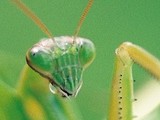 I ran into this article in Live Science a few weeks ago. Evolution is a high-wire tightrope act. Research has shown that male mantids actively try to avoid being eaten by the female. What were the odds that hypothesis would pan out? However, those that are too successful at avoiding being eaten, are also less successful at mating and are weeded from the gene pool. To make matters worse, the mother-to-be who can successfully eat her mate has a better chance of successfully reproducing because of that one big meal at just the right time. We homo sapiens also walk tightropes, just different ones.
I ran into this article in Live Science a few weeks ago. Evolution is a high-wire tightrope act. Research has shown that male mantids actively try to avoid being eaten by the female. What were the odds that hypothesis would pan out? However, those that are too successful at avoiding being eaten, are also less successful at mating and are weeded from the gene pool. To make matters worse, the mother-to-be who can successfully eat her mate has a better chance of successfully reproducing because of that one big meal at just the right time. We homo sapiens also walk tightropes, just different ones.
I grew up in a neighborhood on the edge of a big dirty city. There were about a hundred acres of abandoned farmland that were returning to nature not far from where I lived. The state had purchased it for an interstate that took ten years to get built. My brothers and I would collect praying mantises from this giant weed field and bring them home to act as natural pest control agents in my mother’s garden.
The common mantis is one of the biggest insects in North America, and one of the meanest. You have to grab them just right behind the head. Grab too low and they will reach around and sink their pincers into you. Move too slow and they will turn the table and grab you. Once a mantis has you in his grip, he does not let go, voluntarily. They don’t just bite and hold on either, they start to eat you like an ear of corn. You have to shake them off and deal with the bloody wound later.
Mantids are also the only insect I am familiar with that will actually stare you in the eye … seriously. Look at the above picture. Note the position of the pupils. That mantid is staring right into the camera lens.
The highway was eventually built and houses were constructed on either side of it. Another childhood memory of nature erased by an ever-growing population of upright walking primates following their own set of genetic predilections.

 I ran into this article in
I ran into this article in 

